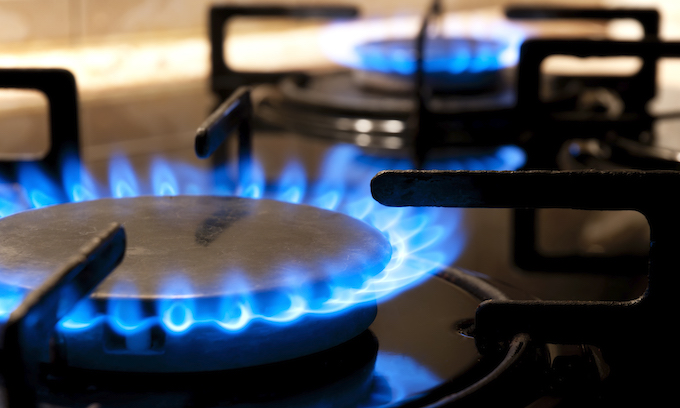A city in California should be able to enforce the nation’s first ban on natural gas piping, President Joe Biden’s administration told a federal court this week.
Berkeley’s ban on the pipes in new construction is allowed because the city was addressing a “health and safety concerns” and is therefore allowed under the Energy Policy and Conservation Act, officials with the U.S. Departments of Energy and Justice said in a June 12 amicus brief to the U.S. Court of Appeals for the Ninth Circuit.
If not, a recent ruling by the appeals court could lead to problems, the officials said.
“Until now, the Department has promulgated energy conservations standards for numerous covered products without fear that, by doing so, the Department would thereby also be preempting vast swaths of State and local health and safety laws. If the panel’s erroneous opinion stands, the Department’s decisions going forward could quickly be overtaken by debates over interference with State and local policy in areas other than energy conservation (and possibly outside the Department’s expertise),” the officials said in the brief.
They asked the court to rehear the case to correct the opinion.
The opinion in question was handed down on April 17.
Three circuit judges found an ordinance adopted by Berkeley in 2019 that barred natural gas infrastructure such as pipes in newly constructed buildings violated the Energy Policy and Conservation Act (EPCA).
The act states that once a federal standard for energy conservation is established for a product such as dishwashers, a state cannot impose a regulation for “the energy efficiency, energy use, or water use of such covered product.”
The law does not allow regulations that relate to the quantity of gas consumed by consumer appliances at places where the appliances are used, the panel said.
“So, by its plain language, EPCA preempts Berkeley’s regulation here because it prohibits the installation of necessary natural gas infrastructure on premises where covered natural gas appliances are used,” Circuit Judge Patrick Bumatay wrote.
He was joined in the 3–0 vote by Judges M. Miller Baker, a Trump appointee, and Diarmuid O’Scannlain, a Reagan appointee.
The panel overturned a ruling from U.S. District Judge Yvonne Gonzalez Rogers, an Obama appointee who had ruled in favor of Berkeley.
Federal officials said in the new brief that ECPA preempts energy conservation standards, not health and safety regulations. Energy conservation standards are defined in the law as “a performance standard which prescribes a minimum level of energy efficiency or a maximum quantity of energy use, or … water use, for a covered product.”
The opinion “upended” the previous understanding that state and local officials can still regulate health, safety, and drought response without fear of running afoul of the law, the Biden administration said.
“It held that a particular municipal ordinance addressing a health and safety concern identified by local elected leaders is preempted by the Act—even though the ordinance does not regulate the energy efficiency, energy use, or water use of a covered product,” they said.
The ruling “cast a cloud of uncertainty over any health or safety law that may indirectly affect someone’s ability to use a product for which the federal government has issued an energy conservation standard,” it added.
Berkeley in May asked for a rehearing, describing the panel’s ruling as straying from how Congress intended ECPA to work and warning of consequences.
“The decision not only condemns Berkeley’s and many similar laws addressing serious harms caused by indoor combustion of natural gas, but also endangers subnational governments’ powers over an array of matters—from building safety, to zoning, fire prevention, and water distribution—that the Constitution, Congress, and history recognize as quintessentially local responsibilities,” lawyers for the city told the court.
A rehearing, if granted, would see the case heard by the full court instead of a panel. It is an alternative to appealing to the U.S. Supreme Court.
Other entities filing briefs in the case include the state of California, Energy and Environmental Law Professors, and the American Thoracic Society.
Both restaurant owners and operators have decried the ordinance, with at least one winning an exemption.
The California Restaurant Association, which brought the case, has said the ruling was correct.
“Cities and states are not equipped to regulate the energy use or energy efficiency of appliances that businesses and homeowners have chosen; energy policy and conservation is an issue with national scope and national security implications. This ordinance, as well as the solution it seeks, is an overreaching measure beyond the scope of any city,” Jot Condie, the association’s CEO and president, said previously.
“Natural gas appliances are crucial for restaurants to operate effectively and efficiently, as they allow for a wide variety of cuisines and innovations in the restaurant industry,” Condie added. “Cities and states cannot ignore federal law in an effort to constrain consumer choice, and it is encouraging that the Ninth Circuit upheld this standard.”



















FINE. THEN CUT the entire state of commiefornia off from ALL POWER created by natural gas!
this is self inflicted destruction by the greenies who have drank the koolaid of the socialist who want total control of our lives.